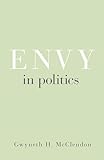Envy in Politics / Gwyneth H. McClendon.
Material type: TextSeries: Princeton Studies in Political Behavior ; 5Publisher: Princeton, NJ : Princeton University Press, [2018]Copyright date: ©2018Description: 1 online resource (248 p.) : 9 b/w illus., 22 tablesContent type:
TextSeries: Princeton Studies in Political Behavior ; 5Publisher: Princeton, NJ : Princeton University Press, [2018]Copyright date: ©2018Description: 1 online resource (248 p.) : 9 b/w illus., 22 tablesContent type: - 9780691178653
- 9781400889815
- 152.48 23
- BF575.E65
- online - DeGruyter
- Issued also in print.
| Item type | Current library | Call number | URL | Status | Notes | Barcode | |
|---|---|---|---|---|---|---|---|
 eBook
eBook
|
Biblioteca "Angelicum" Pont. Univ. S.Tommaso d'Aquino Nuvola online | online - DeGruyter (Browse shelf(Opens below)) | Online access | Not for loan (Accesso limitato) | Accesso per gli utenti autorizzati / Access for authorized users | (dgr)9781400889815 |
Frontmatter -- Contents -- Figures -- Tables -- Acknowledgments -- One. Introduction: Status Concerns and Political Behavior -- Two. Applications -- Three. Elaborations on the Main Arguments -- Four. Conclusion -- Technical Notes -- Bibliography -- Index
restricted access online access with authorization star
http://purl.org/coar/access_right/c_16ec
How envy, spite, and the pursuit of admiration influence politicsWhy do governments underspend on policies that would make their constituents better off? Why do people participate in contentious politics when they could reap benefits if they were to abstain? In Envy in Politics, Gwyneth McClendon contends that if we want to understand these and other forms of puzzling political behavior, we should pay attention to envy, spite, and the pursuit of admiration--all manifestations of our desire to maintain or enhance our status within groups. Drawing together insights from political philosophy, behavioral economics, psychology, and anthropology, McClendon explores how and under what conditions status motivations influence politics. Through surveys, case studies, interviews, and an experiment, McClendon argues that when concerns about in-group status are unmanaged by social conventions or are explicitly primed by elites, status motivations can become drivers of public opinion and political participation. McClendon focuses on the United States and South Africa-two countries that provide tough tests for her arguments while also demonstrating that the arguments apply in different contexts. From debates over redistribution to the mobilization of collective action, Envy in Politics presents the first theoretical and empirical investigation of the connection between status motivations and political behavior.
Issued also in print.
Mode of access: Internet via World Wide Web.
In English.
Description based on online resource; title from PDF title page (publisher's Web site, viewed 27. Sep 2021)


